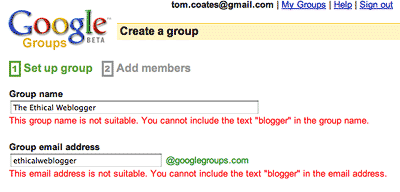Hm. I didn’t realise that Google now had de facto ownership of the term “weblogger”. While trying to play with the new version of Google Groups this afternoon, I was confronted by this infuriating error message:

Hm. I didn’t realise that Google now had de facto ownership of the term “weblogger”. While trying to play with the new version of Google Groups this afternoon, I was confronted by this infuriating error message:

14 replies on “In which Google owns "weblogger"…”
What i find even funnier than this is the fact that microsoft tried to patent the english language lol. Imagine having to pay a monthly fee to microsoft to talk!
_______________
Help Desk Software Consultant
http://www.arseblog.com/april2003part1.html#april1
Spooky.
There goes the “don’t do evil” thing.
In related news I’m told by your comment system that “Your comment was denied for questionable content.”
Maybe you have a problem with me mentioning the word “blogger”? It doesn’t really give any hints as to what’s objectionable…
Hello. Is obviously the fact that they have a trademark on the world Blogger and since they are now public must look out for their shareholders best interests. That, combined with laxadaisical programming which won’t allow you to use your term, really isn’t that big of a deal. Send them a support email.
*word Blogger
so in the end what was the group’s name you came up with? wouldn’t mind joining.
I did have something useful to say here. But I gave up on fighting with your “questionable content” filter.
why not just use “bloggger” ?!!
and see if they patent that as well:)
Seems they allow blogger as a keyword for some strange GoogleRank advertising. I can’t atach a screenie, so use ‘blogger’ as a search term Google and you may just see an online dating service advertised in the sponsored links.
Blogger is a registered trademark (owned by google) if they allow its use without attribution they expose themselves to universal violation, because all a violator has to point out in court is that they allowed the unattributed use of the trademark in their own message boards.
In trademark, you have to be very careful not to be put in a position of seeming to allow violations, or you can lose any trademark case you bring to court.
That would be dangerous with “blogger” in particular because it could be argued (legitimately) that they have attempted to trademark a term which is “common coin” or in regular vocabulary use (like trying to trademark the word Tomato and sue anybody who used it).
A historical example of this is Kleenex, which started out as a trademarked brand name of facial tissue, but ultimately lost it’s protected status because it was determined that the term had become generic.
Odd. I had no problem creating a group with the word “blogger” in it.
http://groups-beta.google.com/group/RubyBloggers
Not sure what I want to *do* with this group I’ve creared, but I was curious to see if it was possible.
will we be sued next for saying the word Blogger? without also saying TM Google?
On Friday, the first day after Merck’s loss of patent exclusivity for the statin Zocor, FDA approved three generic versions of the drug, the Wall Street Journal reports. Teva Pharmaceutical Industries and Ranbaxy Pharmaceuticals for the next 180 days will have exclusive rights to sell generic Zocor, generically known as simvastatin. Teva will sell 5-, 10-, 20- and 40-milligram versions, while Ranbaxy will sell an 80-milligram pill. The generic versions are available at a price that is about 30% less than Zocor’s. In addition, Dr. Reddy’s Laboratories will sell all five dosages of simvastatin under an agreement with Merck to be the authorized generic manufacturer of the drug. FDA’s decision came hours after U.S. District Judge Royce Lamberth denied a motion by Sandoz, Novartis’ generic drug unit, to delay the agency’s approval of generic versions. Lamberth said the delay could damage the finances of Teva and Ranbaxy and could restrict the public’s access to affordable drugs (Won Tesoriero/Zhang, Wall Street Jo
urnal, 6/24). FDA estimated that generic versions of Zocor and other generic drugs approved this week — versions of baldness drug Propecia, prostate drug Proscar and epilepsy treatment Lamictal — could result in $1 billion per year in savings. Rob Seidman, chief pharmacy officer for WellPoint, said 12 million Medicare Part D beneficiaries who use statins could generate $8.2 billion in savings per year if they switched to generic versions (CQ HealthBeat, 6/23).